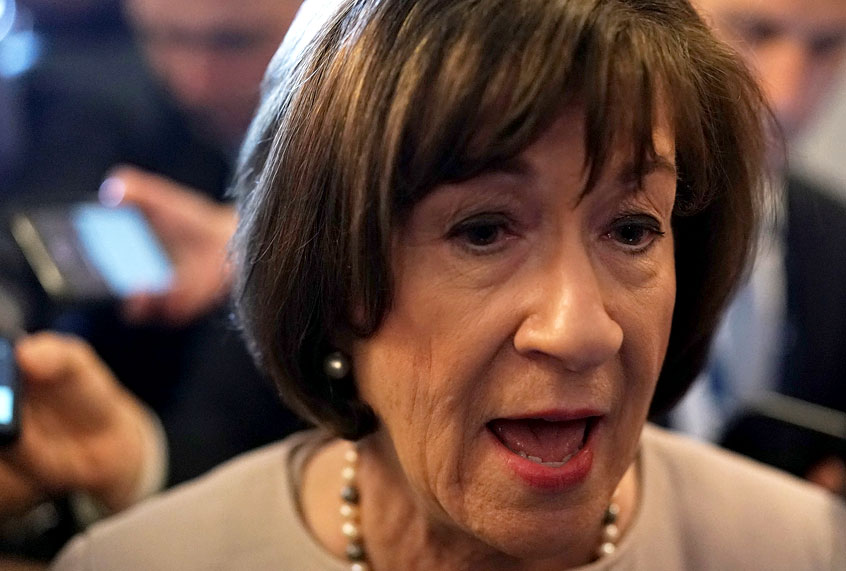Sen. Susan Collins (R-Maine), who has consistently positioned herself as a moderate Republican and advocate for women’s rights, is defending her decision to cast a critical vote to confirm Brett Kavanaugh to the Supreme Court after the newly-appointed associate justice voted in favor of an anti-choice law in Louisiana last week.
The Maine senator claimed she did not believe Kavanaugh would ultimately vote to overturn Roe V. Wade — the Supreme Court decision that protects a person’s right to make their own medical decisions, including the right to terminate a pregnancy.
“I have always been concerned about preserving Roe v. Wade,” Collins told CNN on Monday, reportedly adding that Kavanaugh had assured her during his confirmation process that the landmark opinion was safe.
“He said under oath many times, as well as to me personally many times, that he considers Roe to be ‘precedent upon precedent,’ because it had been reaffirmed in the Casey v. Planned Parenthood case,” the senator added. Collins blamed partisan politics for the criticisms of her decision to back Kavanaugh.
The Maine senator’s comments came after Kavanaugh and the court’s three other conservative members voted to allow the law Louisiana’s Unsafe Abortion Protection Act to take effect. The 2014 law would require abortion providers to obtain “active admitting privileges” at a hospital within 30 miles of the facility where an abortion is performed, something opponents argued would close most of the state’s abortion clinics and leave it with only one physician eligible to perform the procedure. The Louisiana law has never been enforced, and the Supreme Court in 2016 found a nearly identical measure Texas law to be unconstitutional. Chief Justice John Roberts joined the court’s four liberals to temporarily block the measure.
In his dissent, which he wrote separately from the other conservatives on the court, Kavanaugh argued the move to block the law was premature. He noted that Louisiana had already said that if the law were to go into effect, the state would launch a 45-day grace period to review how it would impact existing clinics. No provider, Louisiana’s lawyers promised, would be forced to immediately suspend abortion services. After 45 days, Kavanaugh wrote, if the challengers still thought the law imposed an “undue burden,” they could challenge the law at that time.
“He went out of his way to do a written dissent, in which he very clearly says that he recognizes Whole Woman’s Health as the precedent,” Collins said. “I think there is a deliberate misreading of what he actually wrote — or people have just assumed and not read the decision.
Collins said she does not believe Roe is in grave danger, but noted that she cannot predict how Kavanaugh would vote in every single case.
“To say that this case — this most recent case — in which he wrote a very careful dissent tells you that he’s going to repeal Roe v. Wade, I think is absurd,” she said.
Collins’ has faced mounting criticism over her decision to support Kavanaugh. Although she is not up for reelection until 2020, a group of liberal activists in Maine have raised more than $2 million to fund whoever decides to challenge her — a significant sum for a political race in a smaller state.
“This is a game changer, and certainly connected with people who were demoralized and now are a little bit reinvigorated from the chance of having a representative who truly represents Mainers,” Marie Follayttar Smith, an on-the-ground organizer, told Salon in an interview earlier this year. “Senator Collins can choose to lead by her conscious and lead for her people that she represents or not. For many, this is her final chance of being Margaret Chase Smith.” (Margaret Chase Smith was a U.S. Senator from Maine. She was the first woman to serve in both houses of Congress.)
As the campaign went viral, Collins’ team accused her constituents and people who voted for her re-election to the U.S. Senate in 2014 of bribery.


